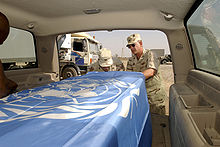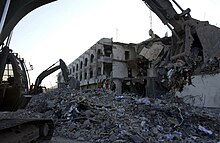|
Canal Hotel bombing
The Canal Hotel bombing was a suicide truck bombing in Baghdad, Iraq, during the afternoon of 19 August 2003. It killed 23 people, including the United Nations' Special Representative in Iraq Sérgio Vieira de Mello, and wounded over 100, including human rights lawyer and political activist Amin Mekki Medani. The blast targeted the United Nations Assistance Mission in Iraq created just five days earlier. (The United Nations had used the hotel as its headquarters in Iraq since the early 1990s.) The 19 August bombing resulted in the withdrawal within weeks of most of the 600 UN staff members from Iraq.[2] These events were to have a profound and lasting impact on the UN's security practices globally.[3][4] The attack was followed by a suicide car bomb attack on 22 September 2003 near U.N. headquarters in Baghdad, killing a security guard and wounding 19 people.[5] Abu Musab al-Zarqawi, the leader of terrorist organization Jama'at al-Tawhid wal-Jihad, in April 2004 claimed responsibility for the 19 August blast.[1] BombingIn his book The Prince of the Marshes, British politician and writer Rory Stewart recounts his experiences at the Canal Hotel on the day of the bombing.
 The explosion occurred while Martin Barber, director of the UN's Mine Action Service (UNMAS), was holding a press conference. The explosion damaged a spinal cord treatment center at the hospital next door and a U.S. Army Civil-Military Operations Centre located at the rear of the Canal Hotel, and the resulting shockwave was felt over a mile away.[citation needed]  The blast was caused by a suicide bomber driving a truck bomb. The vehicle has been identified as a large 2002 flatbed Kamaz (manufactured in Eastern Europe and part of the former Iraqi establishment's fleet).[7] Investigators in Iraq suspected the bomb was made from old munitions, including a single 500-pound aerial bomb, from Iraq's pre-war arsenal.[citation needed] The United Nations Office for the Coordination of Humanitarian Affairs Humanitarian Information Centre (HIC) for Iraq (UNOHCI) was located directly beneath the office of Sérgio Vieira de Mello, the UN High Commissioner for Human Rights, and suffered a direct hit. Of the eight staff and one visitor in the office at the time, seven were killed instantly, but de Mello and Gil Loescher were critically wounded and trapped in debris under the collapsed portion of the building. An American soldier, First Sergeant William von Zehle, crawled down through the collapsed building and worked to extricate the two men. He was joined later by another American soldier, Staff Sergeant Andre Valentine. The two men spent the next three hours trying to extricate the two survivors without benefit of any rescue equipment. Loescher was rescued after having his crushed legs amputated by the soldiers, but Vieira de Mello died before he could be removed.[8] According to Abu Musab al-Zarqawi, Vieira de Mello was specifically targeted in the blast. The reason given by al-Zarqawi for targeting Vieira de Mello was that he had helped East Timor become an independent state (see the Indonesian occupation of East Timor). Zarqawi said that Vieira de Mello had participated in the unlawful removal of territory from the Islamic Caliphate and was therefore a thief and a criminal.[9][10] Second bombThe bombing was followed on September 22, 2003, by another car bomb outside the Canal Hotel. The blast killed the bomber and an Iraqi policeman and wounded 19 others, including UN workers. The second attack led to the withdrawal of some 600 UN international staff from Baghdad, along with employees of other aid agencies. In August 2004, de Mello's replacement, Ashraf Qazi, arrived in Baghdad along with a small number of staff.[11] List of victims
Marilyn Manuel, a member of Vieira de Mello's staff from the Philippines, was originally listed as missing and presumed dead in the collapsed section of the building.[12] However, she had been evacuated to an Iraqi hospital which did not notify the UN of her presence. Her survival was confirmed four days later.[13] Suspects
In an audiotape, published 6 April 2004 on a website and "probably authentic," according to the CIA, Abu Musab al-Zarqawi claimed credit for a number of attacks, including the 19 August 2003 bombing on U.N. quarters in Baghdad.[1] By December 2004, The Jamestown Foundation considered al-Zarqawi and his Jama'at al-Tawhid wal-Jihad responsible for the attack.[15] In January 2005, a top bombmaker for al-Zarqawi's group, Abu Omar al-Kurdi, was captured by the coalition and claimed his associates made the bomb used in the attack. On 16 December 2005, Iraqi authorities issued an arrest warrant for Mullah Halgurd al-Khabir, a commander of Ansar al-Sunna, in connection with the attack.[citation needed] The Italian newspaper Corriere della Sera identified the suicide bomber as Algerian national Fahdal Nassim.[16] Other suspects included Baathists, militant Sunni and Shiite groups, organized crime, and tribal elements. Blame was initially thought to lie with Ansar al-Islam, which was thought at the time to be al-Zarqawi's group. An otherwise unknown group called the "Armed Vanguards of the Second Mohammed Army" claimed they were responsible for the attack.[17] Awraz Abd Aziz Mahmoud Sa'eed, known as al-Kurdi, confessed to helping plan the attack for al-Zarqawi. Al-Kurdi was captured by U.S. forces in 2005, judged and sentenced to death by an Iraqi court, and executed by hanging on 3 July 2007.[18] Responses
The suicide bombing of the United Nations in Baghdad drew overwhelming condemnation. Kofi Annan, United Nations Secretary-General, commented that the bombing would not stop the organization's efforts to rebuild Iraq, and said: "Nothing can excuse this act of unprovoked and murderous violence against men and women who went to Iraq for one purpose only: to help the Iraqi people recover their independence and sovereignty, and to rebuild their country as fast as possible, under leaders of their own choosing." The World Humanitarian DayOn 11 December 2008, the United Nations General Assembly adopted Resolution A/63/139 on "Strengthening of the Coordination of Emergency Assistance of the United Nations," which, among other declarations, designated 19 August as World Humanitarian Day to recognize all humanitarian and United Nations and associated personnel who have worked in the promotion of the humanitarian cause and those who have lost their lives while doing so.[19] See alsoFilmsIn 2004, Gil Loescher's daughter, documentary filmmaker Margaret Loescher, made a critically acclaimed film about her father's experiences called Pulled from the Rubble.[citation needed] A documentary produced in 2009 and a movie released in 2020, both titled Sergio, deal with the life of Sergio Vieira de Mello and the Canal Hotel bombing. References
External links
|
||||||||||||||||||||||||||||||||||||||||||||||||||||||||||||||||||||||||||||||||||||||||||||||||||||||||||||||||||||||||
